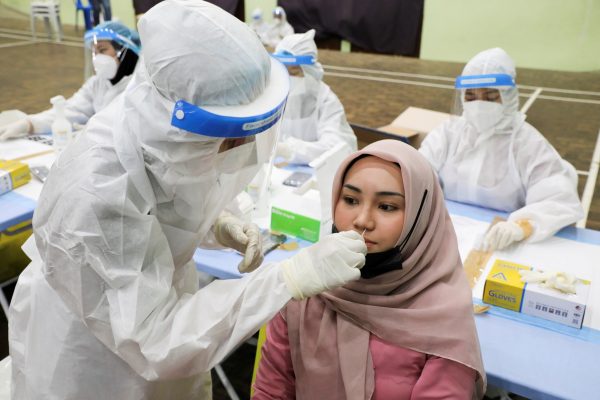To remain open, businesses would instead need to apply for fresh permission letters from ministries that oversee their operations. But on the first day of MCO 3.0, the PN government turned around and again designated the Ministry of International Trade and Industry as the sole authority responsible for approving business applications to operate as essential services. Ismail Sabri translated his frustration into a widely circulated meme that showed him closing the door to his office with a caption ‘I have closed the front door but …’. It was an apparent jab at Azmin Ali, the Minister of International Trade and Industry.
The policy backtrack stemmed from internal disagreement about how open the economy should be during the MCO 3.0 period. Problems of policy incoherency and incompetency have characterised the PN government since the sharp spike in COVID-19 cases in late 2020 following the snap election in the state of Sabah. The hashtag #kerajaangagal (failed government) has been trending on Twitter for months.
The PN government came into power without a mandate and was formed through a politically tenuous coalition that shares no common agenda. Internal tension was on full display from the outset. But the rivalry between the two main Malay nationalist parties in the PN coalition, the United Malays National Organisation (UMNO) and the Malaysian United Indigenous Party (Bersatu), takes centre stage as they compete for support in Malay-majority constituencies.
UMNO has threatened to leave the PN government several times, most recently at its recent Annual General Meeting in late March this year. Former prime minister and current UMNO minister Najib Razak and other UMNO leaders have been using social media to hit out at the PN government for its incompetent handling of the pandemic.
UMNO has held back from withdrawing its support of the PN government due to the inclusion of its 17 members in the cabinet and numerous appointments to government-linked companies that serve as a conduit to government coffers. These are used as a source of patronage to maintain the status quo. If the parliament is dissolved and a fresh election is called, UMNO feels that it has more than a fair chance of sweeping most of the Malay-majority seats and may even be able to stake a claim to the prime ministership.
The current suspension of the Parliament has bought the PN government a lifeline to stave off opposition attempts to pass a vote of no confidence. On 12 January 2021, Prime Minister Muhyiddin Yassin announced a state of emergency that effectively halted all political activities. This included parliamentary sitting — purportedly to bring down the number of daily COVID-19 cases that hovered at 2670. Almost five months later, on the first day of MCO 3.0, the daily number had spiked sharply to 7653. This confirmed the public’s suspicion that the emergency was purely political.
The record number of COVID-19 cases and slow progress of vaccination forced Muhyiddin to impose MCO 3.0. The already unpopular PN government realised it would be politically unpopular to implement a tough lockdown akin to MCO 1.0, which lasted for almost three months and saw the economy shrink by 17 per cent. Since the start of the pandemic, the PN government has spent RM340 billion (US$82 billion) in various forms of temporary economic assistance.
For MCO 3.0, the PN government announced a RM40 billion (US$9.7 billion) economic aid package dubbed ‘Pemerkasa+’ that included most types of assistance and stimuli found in previous MCOs. Even with spending incurred through the economic package, Malaysia’s debt-to-GDP ratio still sits below the 60 per cent ceiling set by the Parliament in August last year. There is still room to increase the debt ceiling if MCO 3.0 is prolonged and more economic assistance is needed. But the only way to do that is by re-opening Parliament, which the PN government appears releuctant to do.
As MCO 3.0 two-week expiration date lapsed, the daily COVID-19 case numbers only show the slightest signs of ebbing. The PN government extended MCO 3.0 for another two-weeks, or until the number of cases reaches a satisfactory level. On 16 June, the Council of Rulers urged the PN government to resume parliamentary sitting as soon as possible.
The PN government finds itself in a messy pandemic situation brought on by sheer incompetency, internal squabbling and a naked pursuit of power. Its only hope is to expedite the mass vaccination drive to achieve herd immunity. By the time this happens, it may face a political reckoning in the form of the general election, a much-dreaded prospect for PN leaders.
Azmil Tayeb is Senior Lecturer of Political Science in the School of Social Sciences at Universiti Sains Malaysia.

